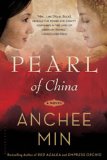Summary | Excerpt | Reading Guide | Reviews | Beyond the Book | Readalikes | Genres & Themes | Author Bio

A Novel
by Anchee MinChapter 1
Before I was Willow, I was Weed. My grandmother, NaiNai, insisted that naming me Weed was better. She believed that the gods would have a hard time making my life go lower if I was already at the bottom. Papa disagreed. "Men want to marry flowers, not weeds." They argued and finally settled for Willow, which was considered "gentle enough to weep and tough enough to be made into farming tools." I always wondered what my mother would have thought if she had lived.
Papa lied to me about my mother's death. Both he and NaiNai told me that Mother died giving birth. But I had already learned otherwise from neighbors' gossip. Papa had "rented" his wife to the town's "Baresticks" in order to pay off his debts. One of the bachelors got Mother pregnant. I was four years old when it happened. To rid her of the "bastard seed," Papa bought magic root powder from an herbalist. Papa mixed the powder with tea and Mother drank it. Mother died along with the seed. It broke Papa's heart, because he had intended to kill the fetus, not his wife. He had no money to buy another wife. Papa was angry at the herbalist, but there was nothing he could do — he had been warned about the poison.
NaiNai feared that she would be punished by the gods for Mother's death. She believed that in her next life she would be a diseased bird and her son a limbless dog. NaiNai burned incense and begged the gods to reduce her sentence. When she ran out of money for incense, she stole. She took me to markets, temples, and graveyards. We would not act until darkness fell. NaiNai moved like an animal on all fours. She was in and out of bamboo groves and brick hallways, behind the hills and around ponds. Under the bright moonlight, NaiNai's long neck stretched. Her head seemed to become smaller. Her cheekbones sharpened. Her slanting eyes glowed as she scanned the temples. NaiNai appeared, disappeared, and reappeared like a ghost. But one night she stopped. In fact, she collapsed. I was aware that she had been ill. Tufts of hair had been falling from her head. There was a rotten smell to her breath. "Go and look for your father," she ordered. "Tell him that my end is near."
Papa was a handsome man in his thirties. He had what a fortuneteller would describe as "the look of an ancient king" or "the matching energy of sky and earth," meaning he had a square forehead and a broad chin. He had a pair of sheep eyes, a garlic-shaped nose that sat on his face like a gentle hill, and a mouth that was always ready to smile. His hair was thick and silky black. Every morning, he combed and braided it with water to make his queue smooth and shining. He walked with his back straight and head up. Speaking Mandarin with an Imperial accent, Papa wore his voice like a costume. But when Papa lost his temper, his voice would slip. People were shocked when Mr. Yee suddenly took up a strange voice. Ignoring NaiNai's opinion that his ambitions would never be realized, Papa dreamed that one day he would work for the governor as an adviser. Papa attended teahouses where he showed off his talent in classic Chinese poems and verse. "I must keep my mind sharp and literary skills tuned," he often said to me. One would never guess from the way he presented himself that Papa was a seasonal coolie.
We lived in Chin-kiang, a small town far away from the capital, Peking, on the south side of the Yangtze River in Jiangsu province. Originally, our family was from Anhui province, a harsh region where survival depended on an endless round of crushing physical labor. For generations my family worked the region's thin and unfertile soil and struggled with famine, flood, locusts, bandits, and debt seekers. NaiNai bragged that it was she who brought "luck" to the Yee family. She was purchased by my grandfather when he was forty years old. No one was allowed to mention that the purchase took place in a local sing-song house. When NaiNai was in her prime, she had a slender figure, a swanlike neck, and a pair of fox eyes with both ends tilted up. She painted her face every day and modeled her hairstyle after the Imperial empress. It was said that men's blood would boil when NaiNai smiled.
From Pearl of China by Anchee Min. Copyright 2010 by Anchee Min. Reprinted by permission of Bloomsbury USA. All rights reserved.
Your guide toexceptional books
BookBrowse seeks out and recommends the best in contemporary fiction and nonfiction—books that not only engage and entertain but also deepen our understanding of ourselves and the world around us.